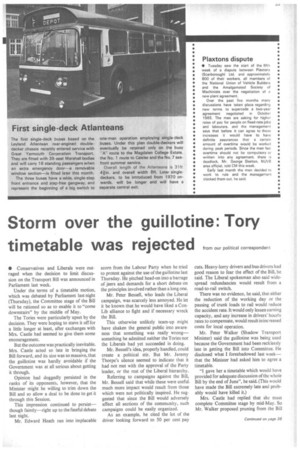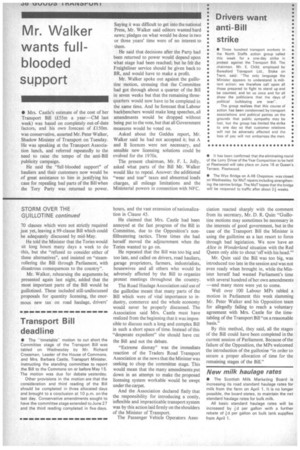Storm over the guillotine: Tory
Page 35

Page 38

If you've noticed an error in this article please click here to report it so we can fix it.
timetable was rejected from our political correspondent
• Conservatives and Liberals were outraged when the decision to limit discussion on the Transport Bill was announced in Parliament last week.
Under the terms of a timetable motion, which was debated by Parliament last night (Thursday), the Committee stage of the Bill will be rationed so as to enable it to "come downstairs" by the middle of May.
The Tories were particularly upset by the decision. They were hoping to stave it off for a little longer at least, after exchanges with Mrs. Castle had seemed to give them some encouragement.
But the outcome was practically inevitable. Mrs. Castle acted so late in bringing the Bill forward, and its size was so massive, that the guillotine was hardly avoidable if the Government was at all serious about getting it through.
Opinion had doggedly persisted in the ranks of its opponents, however, that the Minister might be willing to trim down the Bill and so allow a deal to be done to get it through this Session.
This impression continued to persist— though faintly—right up to the fateful debate last night.
Mr. Edward Heath ran into implacable scorn from the Labour Party when he tried to protest against the use of the guillotine last Thursday. He pitched head-on into a barrage of jeers and demands for a short debate on the principles involved rather than a long one.
Mr. Peter Bessell, who leads the Liberal campaign, was scarcely less annoyed. He let it be known that he would have liked a ConLib alliance to fight and if necessary wreck the Bill.
This otherwise unlikely team-up might have shaken the general public into awareness that something was really wrong— something he admitted neither the Tories nor the Liberals had yet succeeded in doing.
Mr. Bessell's idea, properly handled, could create a political stir. But Mr. Jeremy Thorpe's silence seemed to indicate that it had not met with the approval of the Party leader, or the rest of the Liberal hierarchy.
Referring to campaigns against the Bill, Mr. Bessell said that while these were useful. much more impact would result from those which were not politically inspired. He suggested that since the Bill would adversely affect all sections of the community, such campaigns could be easily organized.
As an example, he cited the lot of the driver looking forward to 50 per cent pay
cuts. Heavy-lorry drivers and bus drivers had good reason to fear the effect of the Bill, he said. The Liberal spokesman also said widespread redundancies would result from a road-to-rail switch.
There was no evidence, he said, that either the reduction of the working day or the passing of trunk loads to rail would reduce the accident rate. It would only lessen earning capacity, and any increase in drivers' hourly rates to compensate, would result in increased costs for local operation.
Mr. Peter Walker (Shadow Transport Minister) said the guillotine was being used because the Government had been recklessly late in getting the Bill into Committee. He disclosed what I foreshadowed last week that the Minister had asked him to agree a timetable.
"I gave her a timetable which would have provided for adequate discussion of the whole Bill by the end of June", he said. (This would have made the Bill extremely late and probably would have killed it.) Mrs. Castle had replied that she must complete Committee stage by mid-May. So Mr. Walker proposed pruning from the Bill
70 clauses which were not strictly required just yet, leaving a 99-clause Bill which could be adequately discussed by mid-May.
He told the Minister that the Tories would sit long hours many days a week to do -this, but she "refused to consider either of these alternatives", and insisted on "steamrollering the Bill through Parliament, with disastrous consequences to the country".
Mr. Walker, rehearsing the arguments he, presented again last night, added that the most important parts of the Bill would be guillotined. These included still-undiscussed proposals for quantity licensing, the enormous new tax on road haulage, drivers' hours, and the vast extension of nationalization in Clause 45.
He claimed that Mrs. Castle had been annoyed at the fast progress of the Bill in Committee, due to the Opposition's nonfilibustering tactics. Three times she had. herself moved the adjournment when the Tories wanted to go on.
He repeated that the Bill was too big and too late, and called on drivers, road hauliers, garage proprietors, farmers, industrialists, housewives and all others who would be adversely affected by the Bill to organize protest meetings throughout the country.
The Road Haulage Association said use of the guillotine Meant that many parts of the Bill which were of vital importance to industry, commerce and the whole economy would never be properly discussed. The Association said Mrs. Castle must have realized from the beginning that it was impossible to discuss such a long and complex Bill in such a short space of time. Instead of this "desperate expedient" she should have cut the Bill and not the debate.
"Extreme dismay" was the immediate reaction of the Traders Road Transport Association at the news that the Minister was seeking to chop the committee stage. This would mean that the many amendments put down in an attempt to make the proposed licensing system workable would be swept under the carpet.
And the Association declared flatly that the responsibility for introducing a costly, inflexible and impracticable transport system was by this action laid firmly on the shoulders of the Minister of Transport.
The Passenger Vehicle Operators Asso
ciation reacted sharply with the comment from its secretary, Mr. D. R. Quin: "Guillotine motions may sometimes be necessary in the interests of good government, but in the case of the Transport Bill the Minister is using the guillotine as a last resort to force through bad legislation. We now have an Alice in Wonderland situation with the Red Queen only able to shout 'off with his head."
Mr. Quin said the Bill was too big, was introduced too late in the session and was not even ready when brought in, while the Minister herself had wasted Parliament's time with several hundred of her own amendments —and many more were yet to come.
Well over 100 Labour MPs tabled a motion in Parliament this week slamming Mr. Peter Walker and his Opposition team for allegedly failing to reach a voluntary agreement with Mrs. Castle for the timetabling of the Transport Bill "on a reasonable basis."
By this method, they said, all the stages of the Bill could have been completed in the current session of Parliament. Because of the failure of the Opposition, the MPs welcomed the introduction of the guillotine "in order to secure a proper allocation of time for the remaining stages Of the Bill."




































































































































